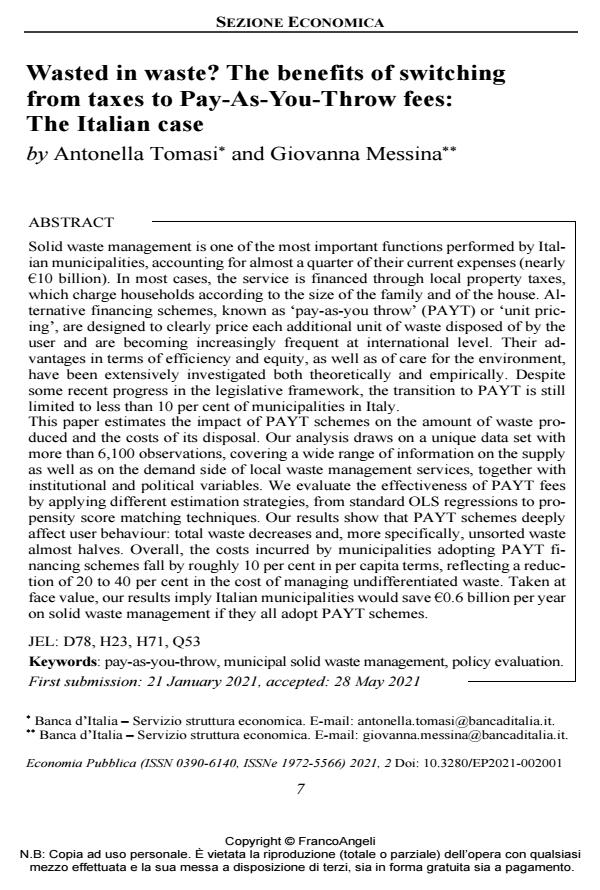Wasted in waste? The benefits of switching from taxes to Pay-As-You-Throw fees: The Italian case
Journal title ECONOMIA PUBBLICA
Author/s Antonella Tomasi, Giovanna Messina
Publishing Year 2021 Issue 2021/2
Language English Pages 32 P. 7-38 File size 484 KB
DOI 10.3280/EP2021-002001
DOI is like a bar code for intellectual property: to have more infomation
click here
Below, you can see the article first page
If you want to buy this article in PDF format, you can do it, following the instructions to buy download credits

FrancoAngeli is member of Publishers International Linking Association, Inc (PILA), a not-for-profit association which run the CrossRef service enabling links to and from online scholarly content.
Solid waste management is one of the most important functions performed by Italian municipalities, accounting for almost a quarter of their current expenses (nearly €10 billion). In most cases, the service is financed through local property taxes, which charge households according to the size of the family and of the house. Alternative financing schemes, known as ‘pay-as-you throw’ (PAYT) or ‘unit pricing’, are designed to clearly price each additional unit of waste disposed of by the user and are becoming increasingly frequent at international level. Their advantages in terms of efficiency and equity, as well as of care for the environment, have been extensively investigated both theoretically and empirically. Despite some recent progress in the legislative framework, the transition to PAYT is still limited to less than 10 per cent of municipalities in Italy. This paper estimates the impact of PAYT schemes on the amount of waste produced and the costs of its disposal. Our analysis draws on a unique data set with more than 6,100 observations, covering a wide range of information on the supply as well as on the demand side of local waste management services, together with institutional and political variables. We evaluate the effectiveness of PAYT fees by applying different estimation strategies, from standard OLS regressions to propensity score matching techniques. Our results show that PAYT schemes deeply affect user behaviour: total waste decreases and, more specifically, unsorted waste almost halves. Overall, the costs incurred by municipalities adopting PAYT financing schemes fall by roughly 10 per cent in per capita terms, reflecting a reduction of 20 to 40 per cent in the cost of managing undifferentiated waste. Taken at face value, our results imply Italian municipalities would save €0.6 billion per year on solid waste management if they all adopt PAYT schemes.
Keywords: pay-as-you-throw, municipal solid waste management, policy evaluation. First submission: 21 January 2021, accepted: 28 May 2021
Jel codes: D78, H23, H71, Q53
Antonella Tomasi, Giovanna Messina, Wasted in waste? The benefits of switching from taxes to Pay-As-You-Throw fees: The Italian case in "ECONOMIA PUBBLICA " 2/2021, pp 7-38, DOI: 10.3280/EP2021-002001